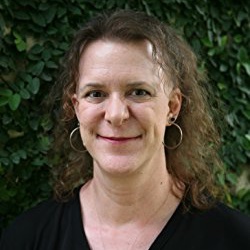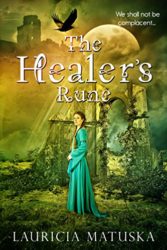 Here’s our author for today’s Six Question Saturday!
Here’s our author for today’s Six Question Saturday!
By day Lauricia Matuska is a teacher; by night she fights time and responsibility to compose a few lines of her novel-in-progress. Her debut fantasy novel The Healer’s Rune was published by Brimstone Fiction in January 2016.
Currently, Lauricia is working on the sequel to The Healer’s Rune, tentatively titled The Guardian Prince. She is in the early stages of revision, and plans to have the manuscript ready to send to her agent by the end of August 2017. You can watch her progress on this work via the progress tracker on her website at Lauricia-Matuska.com.
You can find her here.
http://Lauricia-Matuska.com
https://www.facebook.com/lauricia.matuska
Now… on to the six questions! If you have any questions of your own, please leave them in the comments, and hopefully Lauricia will drop by and answer them.
Question 1: Is there another life experience you’ve had that you believe compares well to writing your first novel in terms of both the difficulty and sense of accomplishment? If not, what do you think might compare well?
Giving birth to my children is an apt comparison. Both are experiences that can’t happen overnight. During the “gestation” periods of both the novel and my sons, there was much creating, developing, arranging, and organizing going on. I am NOT a pleasant pregnant woman, so being pregnant was tedious and—at times—painful, much like writing a novel. Yet when each of my sons was born, I was (and am still) convinced that the every moment of the process was worth it. The same goes for the birth of my novel. As I have watched my children grow and find their own places in the world, so I look forward to watching The Healer’s Rune do the same, in its own way.
Question 2: Tell us about that moment you decided to actually complete a novel. Had writing been on your mind for years, or was it a sudden impulse? What did you do next?
When I was in sixth grade, there was a Saturday cartoon show that turned books into cartoon movies. One day I was so disappointed with the episode I had just seen that I wandered into the kitchen and griped to my mom about it. She challenged me to write a better story, one that I would enjoy. I’m pretty sure that was just a distraction technique on her part, a way to get me out of her hair, but I’ve been hooked ever since. Any time I read an especially well-written book, it makes me ache to write. I literally get such a strong desire to be elsewhere, doing other things, that it drives to me find a pen and some paper. I write to fill this longing, and to contribute to the world of literature is such a large part of who I am.
I tried writing my first novel, called Fifth Empire, in high school, but I was untrained and unmentored. I had no concept of the importance of structure or plot, and the idea didn’t go very far. I can actually only remember the setting of one scene, which may be reprised in a future novel. My second attempt was called The Book of Accounts and, while it was more complete as a novel, it is still the work of someone who doesn’t know much about what she’s doing. That one has the potential to have life breathed in to it at some point, but I have many other ideas I want to flesh out first.
The Healer’s Rune came next, and it was a ten year process. During that time I subscribed to Writer’s Digest magazine, and devoured the teachings of Nancy Kress, who was writing a tutorial column that taught me much of what I needed to know. When my husband graduated with his master’s degree, he suggested I leave the work force to pursue my writing dream. I connected with an excellent writer’s group where I learned much about the craft. Four individuals in particular formed a critique group with me, pouring many hours into providing feedback and insights that helped mold Healer into the novel that finally got published.
Question 3: What’s your writing setup? How do you take notes? What’s your process to develop a first draft? Are any tools critical to your success?
 I have to laugh when you ask about my writing setup, because I live in a very small, hand-built family house. This means my set-up is a lap desk that I use in a recliner in my living room. My laptop is set up a few feet away, on the top of a bookshelf that is falling apart but not yet so much that it’s time I replaced it. I spend a lot of time writing while my husband and sons are in the room, which can be frustrating at times, but I’m thinking some noise-blocking headphones are my next investment. My family also goes through a lot of trouble to be out of the house for a couple of hours every day or so, to give me some quite space for the deep-thinking that I need to do.
I have to laugh when you ask about my writing setup, because I live in a very small, hand-built family house. This means my set-up is a lap desk that I use in a recliner in my living room. My laptop is set up a few feet away, on the top of a bookshelf that is falling apart but not yet so much that it’s time I replaced it. I spend a lot of time writing while my husband and sons are in the room, which can be frustrating at times, but I’m thinking some noise-blocking headphones are my next investment. My family also goes through a lot of trouble to be out of the house for a couple of hours every day or so, to give me some quite space for the deep-thinking that I need to do.
I take notes by hand. It’s a tedious process, but I’ve learned it’s the only one that works for me. I have to physically interact with the information in some way if I’m going to process it on a deep level. I will often by books about writing on my Kindle, then buy the physical copy if I find them especially helpful, so that I can mark them up, flag them with sticky notes, and get deeply involved.
My process of developing a first draft is much the same: kind-of a controlled whirlwind. I begin with an idea and a spiral legal pad (these are the easiest to prop up next to my computer when it’s time to enter everything in the computer). To help with structure, I use a movie-writer-style plot diagram that I learned from, The Weekend Novelist by Robert J. Ray. I write what scenes I know, then do a lot background work for the characters I’m aware of, which inspires more scenes… I go back and forth between writing the scenes and brainstorming the structure until there are enough scenes to represent a novel.
Next comes the first revision. I do a quick read-through of the entire work as I have it laid out, taking notes about what needs fixing but not stopping to work on anything in-depth. This keeps me from getting so caught up in one part of the story that I miss the big picture. After the read-through, I examine the plot and subplots for holes and look at the characters for any lack of development. After fleshing those out, I put the scenes into chapters and send the work to beta readers who let me know of their reactions to the story, as well as any typos that need correcting and any weak spots in the plot or character development. Fixing those is my second revision. Once that is done, it’s off to my agent, more revising based on her feedback and the feedback of her beta readers, then finally to the publisher. There, my editor’s comments and the comments of her beta readers usually frame the fourth revision.
It sounds cheesy, but I can’t work without a good pen and college-ruled paper. My laptop is, of course, essential. Other than that, I have a whole library of how-to books and resources that I can’t live without. The list is long and can be read in its entirety on my webpage, but a few that are crucial are the afore-mentioned The Weekend Novelist by Robert J. Ray, Writing a Breakout Novel by Donald Maass, and Creating Character Arcs and Outlining Your Novel by K. M. Weiland.
Question 4: What book or series would you most love to see made into a movie or Netflix series? What would you fear the director or screenwriter would get wrong?
This is a tricky question. For the most part, I loathe movie adaptations of my favorite books. I can’t remember who said it, although I think its Stephen King, but some famous author says that a great story is a collaboration between the writer and the reader. Both provide details that make the book what it becomes in the reader’s mind. By necessity, any producer or director’s vision of my favorite books can’t match my concept of those books, so their adaptations are bound to be disappointing. That said, I’m very impressed with the movie adaptations of Harry Potter. Those movies are very true to the novels.
If I were to choose a series to adapt, I would pick the Memory, Sorrow, and Thorn series by Tad Williams. I read that series in high school and was so profoundly affected that now, 25 years later and without having re-read the books until now, I find that many of the elements in my current trilogy echo those in William’s work. I would fear that the storyline would be too warped or the characters would not be drawn as the author described them, or that my favorite scenes were incorrectly rendered or just plain deleted. So much could go wrong, but with today’s special effects and Tad William’s very close, very direct collaboration, so much could go right.
Question 5: Can you write some verse (any form) that describes your hopes as an author? Or the theme of one of your books?
The Never-Ending Quest for The Perfect Pen
A sonnet about the author’s life
The perfect pen is a true work of art
Carefully balanced in weight, shape, and length.
Mightily strong, it is my fount of strength.
When writing my books, it plays no small part.
I test several varieties, choosing
With care. Many I purchase in the hope
Their ink will flow smoothly. If not, I’ll cope
Until I find another fit for using.
One dreary day, morose and dejected,
The Perfect Pen filled my heart with such glee,
I bought extra boxes to take home with me
And wrote page after page as expected.
Needing a new one, I went to the store
Only to learn it’s not made anymore!
Question 6: You step onto an elevator with three other people, all representatives of your core audience. The doors close. You have their attention until they get off 18 floors later. Buddy the elf is not on the elevator with you, so it’s going to be a quick trip. What do you say to convince them to read your novels?
My work is nostalgic of classic fantasy, but with a different twist on old tropes and motifs and a fresh perspective on contemporary issues. I write stories for people who love the genre but want to see it go beyond the usual elements that cause some critics to call it contrived or cliché, so anyone who likes fantasy and wants to see a new twist on the classic elements will enjoy it. There is also a lot of appeal for readers who are looking for a strong female protagonist. While there are no overtly romantic elements in the first book of The Healer’s Rune series, the groundwork is laid for a relationship to develop in the second and third books, so that will appeal to readers who enjoy a bit of romance. However, there will be no erotic scenes, so readers who are looking for “clean” books need not be wary – this series, and all of the stories I plan to write, will contain inspiring romance, not questionable details.

